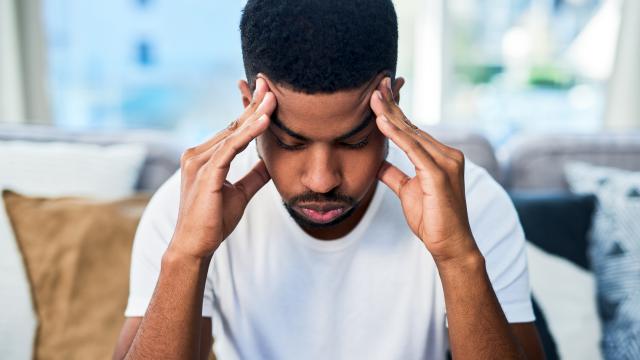Picture this: you wake up after a big night out with a few too many drinks, your head is feeling worse for wear and you’re pretty sure you’re still wearing your jeans. You roll over and slowly open your eyes, reaching for your phone – then it hits you, a wave of intrusive thoughts. “Was I embarrassing last night?” “Did I say something stupid” “Am I the absolute worst?” This, dear friend, is what we like to refer to as hangxiety.
Not to be confused with general anxiety, hangxiety is a term of its own and is sometimes experienced by people after drinking in excess. If you’re new to it (welcome, it’s terrible here) and would like to learn more, we’ve pulled together a bit of a guide based on some advice offered by Lysn psychologist Nancy Sokarno.
Here we go.
First thing’s first: what the hell is hangixety?
If you haven’t worked it out just yet, hangxiety is a term that combines hangover and anxiety to describe the sense of dread you may experience while hungover.
Sokarno explained that drinking too much alcohol does more than leave you feeling tired with a pounding headache, “it can have an overwhelming effect on our mental state,” too.
“…most people might put their change in mood down to usual hangover effects, [but] feeling low the day after drinking could actually point to hangxiety,” she shared.
Okay, but is it legit?
Sure, we may throw around the term hangxiety every few weekends, but what do the experts say about this experience? Is it all just part of the hangover game, or is it a little different?
Long story, short – it depends. Alcohol can impact different people in a range of ways, and that may mean that hangovers bring on feelings of anxiety for you, unfortunately.
Ultimately, Sokarno stressed that “alcohol is a depressant, which means it can disrupt our brain chemistry”.
“Drinking can lower levels of serotonin in our gut and brain, which is our ‘feel good’ neurotransmitter responsible for regulating our moods and social behaviour. A drop in these serotonin levels can be linked to things like depression, anxiety and insomnia,” she explained.
So, while hangxiety is not promised with every hangover, it certainly is a possibility for many people.
In addition to changes in mood, alcohol is also known to mess with the balance of certain chemicals in your brain, like “glutamate (responsible for making your brain more active) and GABA (Gamma-aminobutyric acid, which makes it less active),” Sokarno said.
“The consumption of alcohol increases the amount of GABA, whilst simultaneously decreasing the amount of glutamate (meaning your brain starts acting in slow motion hence the lowered inhibitions and slower reactions).”
The morning after this change up in your brain, your body will try and rebalance these chemicals which leave it quite sensitive to glutamate, which Sokarno shared makes you anxious, and less sensitive to GABA, which is the chemical that calms you down.
My poor brain.
We’re not done yet, either. Sokarno went on to share that “on top of this, when our bodies try to break down alcohol it produces the toxic by-product acetaldehyde, which is a chemical compound that produces symptoms such as anxiety, incoordination, memory impairment and an elevated heart rate”.
Then there is the impact of both worsened sleep and lower blood glucose levels which “can leave us feeling low on energy, irritable and nauseous”.
Finally, there is also the chance that because of the booze you may have said or done something a little bit out of character, and this creates “the perfect recipe for feeling a case of hangxiety,” Sokarno said.
Got all that?
How do you manage a bout of hangxiety?
If the above hasn’t convinced you to never drink again (I’m considering it), you may be wondering what the best way to manage hangxiety might be.
Obviously, a departure from big nights of drinking will help reduce your risk of experiencing hangxiety. Sokarno highlighted that you may begin to find that the after-effects “can begin to outweigh the feel-good effects at the time” of drinking. However, if the idea of abstaining from alcohol all together doesn’t work for you, she suggested “cutting back on your alcohol consumption or having alcohol-free weekends where possible”.
Additionally, she recommended matching the alcohol you consume with water, and that you try and eat a good meal before drinking. It’s also worth trying to exercise the next day.
“While you might feel like staying curled up in a ball under a doona…try to do some activities that could take your mind off how you feel,” she said.
It is also worth pointing out that in extreme situations, you might find that drinking is becoming a problem for you. If that’s the case, Sokarno stressed that it is important you seek out professional support.
“People suffering from alcohol addiction typically experience a host of symptoms that can be both emotional and physical,” she said. “Services like Lifeline [13 11 14] and Beyond Blue all provide free support by way of over-the-phone counselling with trained experts.”
In the end, waking up in the morning with a sense of dread hanging over your head is not a pleasant experience for anyone. If hangxiety is messing up your weekends, it’s probably worth having a think about the best next steps to reducing its weight.
Nancy Sokarno is a psychologist at Lysn. Lysn is a digital mental health company with world-class wellbeing technology that helps people find their best-fit professional psychologist whilst being able to access online tools to improve their mental health.

Leave a Reply
You must be logged in to post a comment.